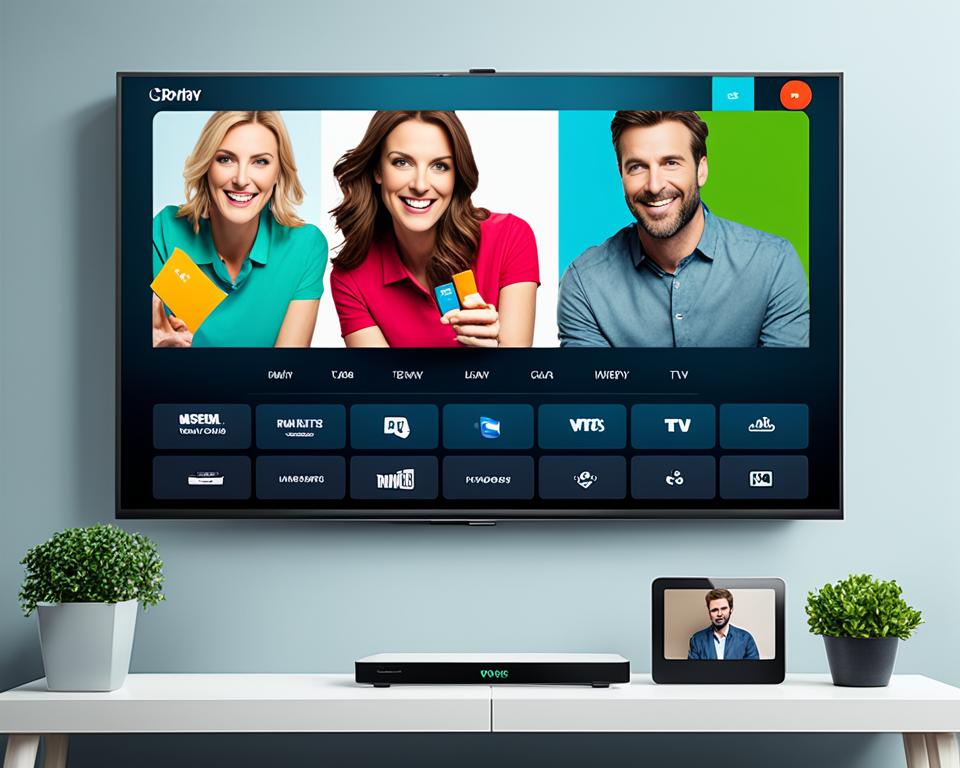Are you tired of traditional television and looking for a new way to enjoy your favorite shows and movies? Have you heard about IPTV but are unsure if it’s the right choice for you? Whether you’re a tech enthusiast or a casual viewer, it’s essential to understand the pros and cons of IPTV to make an informed decision.
IPTV, or Internet Protocol Television, has gained popularity as an alternative to conventional TV broadcasting. With IPTV, you can stream content over the internet, giving you access to a wide range of channels and on-demand entertainment. But is it worth it? Let’s explore.
In this article, we will delve into the advantages and challenges of IPTV, helping you determine if it’s the right fit for your entertainment needs. We’ll discuss the benefits, drawbacks, customization features, costs, legal concerns, and technical requirements associated with IPTV.
So, are you ready to discover if IPTV is the future of television? Let’s dive in!
Understanding IPTV: What You Need to Know
Before diving into the pros and cons, it’s important to understand what IPTV is and how it differs from traditional television. In this section, we’ll provide an overview of IPTV technology and compare it to conventional TV broadcasting.
IPTV, or Internet Protocol Television, is a digital television broadcasting method that utilizes internet protocol networks for delivering television content to viewers. Unlike traditional TV, which relies on terrestrial, cable, or satellite broadcasts, IPTV transmits television signals over the internet, allowing users to access a wide range of channels and content from anywhere with an internet connection.
One of the key features that sets IPTV apart from traditional TV is its interactive and on-demand capabilities. With IPTV, users can enjoy a personalized viewing experience, choosing what to watch and when to watch it. They have the flexibility to pause, rewind, or fast-forward live TV shows, movies, and sports events, providing a level of control that traditional TV lacks.
Another significant difference between IPTV and traditional TV is the way content is delivered. With IPTV, content is streamed over the internet in real time or made available for on-demand streaming. This eliminates the need for physical media such as DVDs or Blu-rays and allows for more efficient content distribution.
When comparing IPTV to traditional TV, one key advantage is the extensive channel selection. IPTV services offer a vast catalog of channels from around the world, giving viewers access to international content, regional broadcasts, and niche programming that may not be available through traditional TV providers.
Furthermore, IPTV allows for multi-screen capabilities, meaning users can watch TV on different devices such as smartphones, tablets, or smart TVs simultaneously. This flexibility enables users to enjoy their favorite shows or sports events on the go or in different rooms of their homes.
However, it’s essential to note that IPTV relies heavily on a stable and high-speed internet connection. Insufficient bandwidth or network congestion can result in buffering issues and interruptions in the streaming experience. Users need to ensure they have a reliable internet service provider and adequate internet speeds to enjoy seamless IPTV streaming.
Overall, IPTV offers a range of features and benefits that make it a compelling alternative to traditional TV. In the next section, we’ll delve deeper into the advantages and disadvantages of IPTV, helping you decide if it’s the right choice for your entertainment needs.
The Benefits of IPTV
IPTV, or Internet Protocol Television, offers numerous advantages that have made it a popular choice among consumers. In this section, we will explore the benefits of IPTV, including its flexibility of content, access to a wide range of channels, and the convenience of on-demand streaming. Additionally, we will delve into the different types of IPTV subscriptions available.
Flexibility of Content
One of the key advantages of IPTV is the flexibility it offers in terms of content. Unlike traditional television, IPTV allows users to access a vast range of multimedia content beyond traditional broadcast channels. With IPTV, you can customize your viewing experience by selecting the specific genres, shows, and movies that interest you the most. This flexibility ensures that you can enjoy personalized entertainment tailored to your preferences.
Access to a Wide Range of Channels
IPTV provides access to a plethora of channels, including international channels that may not be available through traditional television providers. Whether you’re interested in news, sports, entertainment, or educational content, IPTV has a wide variety of channels to cater to every interest. This extensive selection ensures that you can explore diverse content from around the world, expanding your entertainment horizons.
The Convenience of On-Demand Streaming
One of the standout features of IPTV is the convenience of on-demand streaming. With IPTV, you no longer have to adhere to fixed broadcasting schedules or wait for reruns. Instead, you can enjoy your favorite shows and movies whenever and wherever you desire. Whether you prefer binge-watching your favorite series or catching up on missed episodes, IPTV’s on-demand streaming capabilities offer unparalleled convenience and flexibility.
Different Types of IPTV Subscriptions
IPTV subscriptions come in various forms, allowing users to choose a package that suits their needs and preferences. Some IPTV providers offer basic packages that include a limited number of channels, catering to budget-conscious consumers. On the other hand, premium IPTV subscriptions offer a more comprehensive range of channels, including specialized content and premium networks. These subscriptions often provide additional features such as video-on-demand libraries and exclusive access to sports events. By exploring the different types of IPTV subscriptions, you can find a plan that aligns with your desired content selection and budget.
In the next section, we will discuss the drawbacks of IPTV, including potential issues with quality and reliability. Understanding both the advantages and challenges of IPTV will give you a comprehensive view to make an informed decision about adopting this technology.

Quality and Reliability: The Drawbacks of IPTV
While IPTV offers a range of benefits, it is not without its drawbacks. Understanding these challenges is crucial in assessing whether IPTV is the right choice for your entertainment needs. Let’s explore some of the key drawbacks you should consider before making a decision.
Potential Buffering Issues
Buffering can be a frustrating experience when streaming content through IPTV. It occurs when there is a delay in the playback of media due to buffering time, often caused by unstable or slow internet connections. Buffering issues can interrupt your viewing experience and hinder the enjoyment of your favorite shows or movies.
Dependence on High-Speed Internet
IPTV heavily relies on a stable and high-speed internet connection to deliver seamless streaming. Without a fast and reliable internet connection, you may experience lagging, freezing, or low-quality video playback. This dependence on internet connectivity might be a limiting factor, especially in areas with limited internet infrastructure or inconsistent network coverage.
Reliability of IPTV Service Providers
The reliability of IPTV service providers can vary significantly. Some providers may experience frequent service disruptions, leading to interrupted viewing or even complete outages. It’s essential to research and choose a reputable IPTV provider with a track record of delivering consistent service and reliable customer support.
“Buffering issues, dependence on high-speed internet, and the reliability of IPTV service providers are some of the challenges that users may encounter when using this technology.” – IPTVReviews.com
Customer Reviews and Ratings
Before subscribing to an IPTV service, it’s beneficial to read customer reviews and ratings for a more well-rounded perspective. Reviews can provide insights into the reliability, streaming quality, customer support, and overall user experience of different IPTV providers. Taking the time to research user feedback can help you avoid potential pitfalls and make an informed decision.
| Drawbacks | Impact |
|---|---|
| Buffering issues | Interruptions and decreased viewing experience |
| Dependence on high-speed internet | Limited accessibility in areas with poor internet connectivity |
| Reliability of IPTV service providers | Potential service disruptions and outages |
| Customer reviews and ratings | Insights into overall user satisfaction and provider performance |
IPTV Security Concerns
As with any internet-based service, security is a critical factor to consider when analyzing IPTV features and comparing IPTV to traditional TV. This section will address common security concerns related to IPTV, including piracy issues and the risk of unauthorized access.
Piracy Issues:
IPTV’s popularity has attracted the attention of copyright infringers and illegal streaming services. Unauthorized distribution of copyrighted content through IPTV platforms is a significant concern, both for content creators and consumers. This not only undermines the revenue streams of legitimate providers but also poses legal risks for those involved in accessing or distributing pirated content.
Piracy hampers the growth of legitimate IPTV services and compromises the overall stability and quality of the platform.
IPTV providers are actively addressing these issues by implementing robust security measures and regularly monitoring content to detect and take down pirated streams. By partnering with content creators and employing advanced content identification technology, legitimate IPTV services strive to ensure a secure and legal viewing experience for their users.
Risk of Unauthorized Access:
Since IPTV relies on internet connectivity, there is a potential risk of unauthorized access to user data and personal information. Malicious individuals may attempt to gain access to IPTV systems and expose sensitive customer information or use unauthorized methods to stream content.
It is crucial for IPTV providers to prioritize user data protection and implement strict security protocols to mitigate the risk of unauthorized access.
Reputable IPTV service providers prioritize user data protection by employing encryption protocols, secure authentication processes, and regular security audits. Users can also play their part in enhancing security by ensuring the proper use of strong passwords and keeping their IPTV devices and apps updated with the latest security patches.
To protect the integrity and security of the IPTV ecosystem, it is essential for users to choose reliable and trustworthy IPTV service providers that prioritize security and actively engage in combating piracy and unauthorized access.
IPTV Security Measures
To safeguard content and user data, IPTV providers employ various security measures, including:
- Encryption protocols to protect against unauthorized access.
- Secure authentication processes to verify user identity.
- Advanced content identification technology to detect pirated streams.
- Regular security audits to identify and address vulnerabilities.
- Partnerships with content creators to combat piracy.
By implementing these security measures, IPTV providers are constantly working toward ensuring a secure and reliable viewing experience for their users.
Customization and Personalization: IPTV’s Unique Features
When it comes to entertainment options, one size does not fit all. That’s where the customization and personalization features of IPTV come into play. IPTV (Internet Protocol Television) offers a range of unique features that allow users to tailor their viewing experience to their specific preferences. From interactive menus to multi-screen capabilities, IPTV provides a level of personalization that traditional TV services can’t match.
IPTV Features Analysis
Let’s take a closer look at some of the key features that make IPTV stand out:
- Interactive Menus: IPTV platforms often include interactive menus that provide users with easy navigation and intuitive control over their content. With just a few clicks, you can access your favorite channels, movies, or shows, enhancing the overall user experience.
- Multi-Screen Capabilities: IPTV allows you to stream your favorite content across multiple screens simultaneously. Whether you’re watching a sports event on your living room TV or catching up on a series on your tablet, IPTV offers the flexibility to enjoy your entertainment wherever and whenever you want.
- Personalized Recommendations: IPTV services analyze your viewing habits and preferences to provide personalized recommendations based on your interests. This feature ensures that you never miss out on content that aligns with your taste, making your entertainment choices even more curated and enjoyable.
With the ability to customize your channel lineup, create personalized playlists, and receive tailored content suggestions, IPTV puts you in control of your viewing experience like never before.
Choosing the Best IPTV Service
Now that you understand the unique features offered by IPTV, it’s important to choose the right service provider to maximize your experience. Here are a few tips for selecting the best IPTV service:
- Research and compare different IPTV service providers to find the one that offers the features and channel lineup that align with your preferences.
- Consider the reliability and stability of the IPTV service, ensuring minimal buffering or downtime during your favorite shows.
- Read reviews and user ratings to gauge the overall satisfaction and performance of the IPTV service.
- Take advantage of trial periods or free demos offered by IPTV providers to test the service before committing to a subscription.
By considering these factors and making an informed decision, you can ensure that your IPTV experience is tailored to your preferences and offers a seamless viewing experience.
With its unique customization and personalization features, IPTV provides a refreshing alternative to traditional television, allowing you to create an entertainment experience that is truly yours.

Cost Considerations: Is IPTV Worth It?
When considering IPTV as a potential entertainment option, it’s important to assess its value within your budget. In this section, we will delve into the financial aspects of IPTV, including subscription fees, potential additional charges, and a comparison of costs with traditional cable or satellite TV services.
Let’s start by exploring the subscription details for IPTV. The costs associated with IPTV subscriptions can vary depending on the provider and the package you choose. Subscription fees typically cover access to a wide range of channels, including premium content and on-demand streaming services. Some providers offer tiered pricing options with different levels of features and channel availability. It’s crucial to review the details of each subscription plan to ensure it aligns with your viewing preferences and budget.
Additionally, it’s important to be aware of potential additional charges that may arise when using IPTV. These charges can include fees for accessing premium content, renting movies or TV shows, or upgrading your subscription to include specialized channels or sports packages. Understanding these potential expenses will help you make an informed decision about the overall affordability of IPTV.
To determine if IPTV is worth the investment, it’s helpful to compare its costs with those of traditional cable or satellite TV services. Let’s take a look at a cost comparison table that showcases the potential savings of IPTV:
| Service | Monthly Subscription Cost | Additional Charges | Total Cost per Month |
|---|---|---|---|
| IPTV | $20 | $5 (premium content) | $25 |
| Cable TV | $80 | $15 (premium channels) | $95 |
| Satellite TV | $70 | $10 (premium packages) | $80 |
This cost comparison table demonstrates the potential savings that IPTV can offer compared to traditional cable or satellite TV services. With lower monthly subscription costs and potentially fewer additional charges, IPTV can be a more affordable option for many consumers.
Ultimately, whether IPTV is worth it for you depends on your entertainment preferences, budget, and desired features. Consider the variety of channels and content available, the convenience of on-demand streaming, and the potential savings compared to traditional TV services. By weighing these factors, you can make an informed decision about whether IPTV is a valuable investment for your entertainment needs.
Legal and Copyright Issues in IPTV
IPTV operates within a complex legal landscape, where concerns regarding copyright infringement and piracy arise. It is crucial to understand the legal implications of using IPTV services and ensure that you access content through legitimate means. In this section, we will provide insights into copyright laws and emphasize the significance of supporting content creators.
“Respecting copyright laws not only safeguards the intellectual property of creators but also supports the sustainable growth of the entertainment industry.”
Copyright infringement is a serious offense and should be avoided when consuming IPTV content. IPTV services that offer unauthorized access to copyrighted material can face legal consequences, and users engaging in the streaming or downloading of pirated content may also be held accountable.
Content creators invest their time, effort, and resources into producing quality entertainment. It is important to respect their work by seeking licensed IPTV providers and accessing content through legal means. By doing so, you contribute to the continued production and availability of high-quality entertainment options.
Ensuring that IPTV services abide by copyright laws not only protects you legally but also helps maintain a fair and sustainable entertainment ecosystem. It fosters a supportive environment for content creators, encouraging them to produce innovative and diverse content that enhances the overall viewing experience.
Legal Implications of IPTV
| Legal Perspective | Impact |
|---|---|
| Potential copyright infringement | Risks legal consequences for both IPTV service providers and users |
| Lack of royalties to content creators | Undermines the financial viability of content creation |
| Supporting piracy | Contributes to the decline of licensed content and promotes unethical practices |
| Diminished credibility of IPTV industry | Affects the reputation and long-term sustainability of IPTV services |
To fully enjoy the benefits of IPTV while respecting legal and copyright obligations, it is essential to choose reputable IPTV service providers that offer licensed content and comply with copyright laws. This ensures that you can access your favorite shows and movies in a legal and ethical manner, supporting the flourishing global entertainment industry.

Technical Requirements and Set-Up
To fully enjoy the benefits of IPTV, it’s important to have the necessary equipment and set up your system properly. This section will guide you through the technical requirements and step-by-step installation process of IPTV. Additionally, we’ll provide tips on how to choose a reliable IPTV service provider.
Equipment Requirements
Before setting up your IPTV system, ensure that you have the following equipment:
- Television: A compatible television or a device, such as a smart TV, that can connect to the IPTV service.
- Internet Connection: A high-speed internet connection, preferably with a minimum download speed of 10 Mbps for standard definition (SD) content and 25 Mbps for high definition (HD) content.
- IPTV Set-Top Box: An IPTV set-top box or a compatible device, such as an Android TV box or Amazon Fire TV Stick, to receive and decode the IPTV signal.
- Remote Control: A remote control that comes with the IPTV set-top box or a compatible device to navigate through the IPTV channels and menus.
It’s important to note that the specific equipment requirements may vary depending on the IPTV service provider and the devices supported.
System Set-Up
Setting up your IPTV system typically involves the following steps:
- Connect your IPTV set-top box or compatible device to your television using an HDMI or AV cable.
- Connect the set-top box or device to your home internet network using either an Ethernet cable or Wi-Fi connection.
- Turn on your television and IPTV set-top box or device.
- Follow the on-screen instructions to configure the initial settings and connect to your IPTV service.
- Once connected, you’ll be able to access the IPTV channels and content through the user-friendly interface provided by the IPTV service.
It’s recommended to refer to the user manual or instructions provided by your IPTV service provider for detailed information on system set-up.
Choosing a Reliable IPTV Service Provider
When selecting an IPTV service provider, consider the following factors:
- Content Library: Ensure that the IPTV service offers a wide range of channels and content that aligns with your preferences.
- Reliability: Look for a provider that offers a stable and uninterrupted streaming experience without frequent buffering or service disruptions.
- User Interface: Evaluate the user interface of the IPTV service to ensure it is intuitive, easy to navigate, and visually appealing.
- Customer Support: Check the availability and responsiveness of customer support to address any technical issues or concerns.
- Pricing: Compare the subscription plans and pricing of different IPTV service providers to find the best value for your budget.
Reading customer reviews and seeking recommendations can also help you make an informed decision when choosing an IPTV service provider.
By meeting the technical requirements, following the set-up instructions, and selecting a reliable IPTV service provider, you’ll be ready to enjoy the extensive content options and personalized viewing experience offered by IPTV.
Conclusion
After analyzing the pros and cons of IPTV, it’s clear that this innovative technology offers exciting possibilities for entertainment enthusiasts. The benefits of IPTV include greater flexibility in content choice, access to a wide range of channels, and the convenience of on-demand streaming. Additionally, IPTV provides unique features like interactive menus, multi-screen capabilities, and personalized recommendations, ensuring a personalized viewing experience.
However, it’s important to consider the drawbacks before deciding if IPTV is the right choice for you. These include potential buffering issues, reliance on high-speed internet, and concerns about the reliability of service providers. Additionally, there are legal considerations surrounding copyright infringement and piracy, so it’s vital to ensure that you are accessing IPTV content through legal means.
Another key factor to evaluate is the cost of adopting IPTV. While it may require a financial investment, comparing subscription fees and additional charges with traditional cable or satellite TV services can help determine if IPTV is worth it for your budget. Considering your preferences, priorities, and technical requirements is crucial in making an informed decision about adopting IPTV as your preferred entertainment solution.
FAQ
What is IPTV? How does it differ from traditional TV?
What are the benefits of IPTV?
What are the drawbacks of IPTV?
Is IPTV secure?
How much does IPTV cost?
Are there legal issues associated with IPTV?
What are the technical requirements for IPTV?
Is IPTV worth it?






